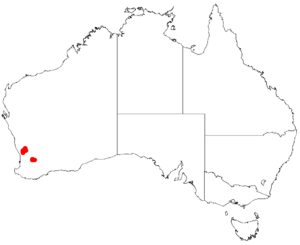Acacia anarthros facts for kids
Quick facts for kids Acacia anarthros |
|
|---|---|
| Conservation status | |
| Scientific classification | |
| Genus: |
Acacia
|
| Species: |
anarthros
|
 |
|
| Occurrence data from AVH | |
Acacia anarthros is a special kind of shrub. It belongs to the Acacia plant family. This plant is only found in a small part of southwestern Australia. It's a unique plant that grows in dry areas.
Contents
What Does Acacia anarthros Look Like?
This shrub is usually spiky and grows to be about 0.1 to 0.5 metres (0.3 to 1.6 ft) tall. Its branches are hairy and bendy. They have small, spiny parts called stipules, which are like tiny leaves at the base of the main leaves. These stipules are about 3 to 7 mm (0.12 to 0.28 in) long.
The main stem of its leaves is strong and can be straight or curved. It measures about 0.5 to 2 cm (0.20 to 0.79 in) long. Each leaf has one pair of small leaflets called pinnae, which are 2 to 5 mm (0.079 to 0.197 in) long. On these pinnae, there are two to three pairs of even smaller, green, smooth leaflets called pinnules. These pinnules are 4 to 10 mm (0.16 to 0.39 in) long and 0.5 to 1.5 mm (0.020 to 0.059 in) wide.
Flowers and Seeds
Acacia anarthros blooms from June to September. It produces bright yellow flowers. The flowers grow in round clusters, with 14 to 16 golden flowers in each cluster. These clusters grow by themselves where the leaves meet the stem.
After the flowers, the plant forms seed pods. These pods are hairy and tough, shaped like a narrow rectangle. They can grow up to 6 cm (2.4 in) long and are 5 to 8 mm (0.20 to 0.31 in) wide. Inside the pods are seeds. The seeds are round or oval, about 3 to 4 mm (0.12 to 0.16 in) long, and look slightly wrinkled under a microscope.
How Was Acacia anarthros Named?
The plant was first officially described by a botanist named Bruce Maslin in 1979. He wrote about it in a scientific journal called Nuytsia.
Later, in 2003, another botanist named Leslie Pedley changed its name to Racosperma anarthon. However, in 2006, it was moved back to the Acacia group. This means its official name is Acacia anarthros again. There is also another old name for it, Acacia drewiana subsp. pungens, but it's not used anymore.
Where Does Acacia anarthros Grow?
This plant is only found in a small area of the Wheatbelt region in Western Australia. This means it is endemic to that specific place. It likes to grow on hillsides in gravelly soil that contains a lot of laterite.
You can find Acacia anarthros mostly around a town called New Norcia. It grows in areas of low, shrubby plants called heathland. It also grows in open woodlands where Eucalyptus wandoo or Corymbia calophylla trees are common.


